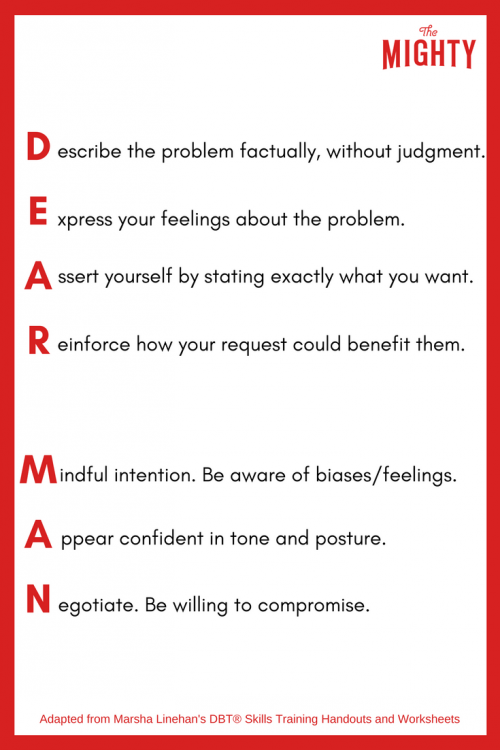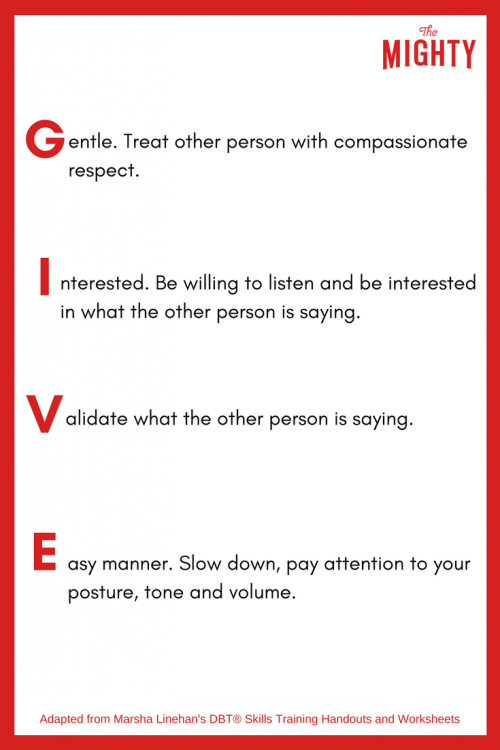5 Things People With Borderline Personality Disorder Do That Get Mistaken for 'Manipulation'
People with the diagnosis of borderline personality disorder (BPD) face some of the harshest stigma in the mental health community. From internet articles labeling people with BPD as “dangerous” life-ruiners to clinicians who flat out refuse to treat patients with BPD, it’s no wonder folks who live with this condition often feel misunderstood and alone in their struggles.
Though so much is still misunderstood about BPD, there is one harmful (and inaccurate) stereotype that comes up again and again: People with BPD are manipulative.
But some of the things people with BPD do that are commonly viewed as being “manipulative” (like threatening suicide for example) aren’t actually intended that way at all. The word “manipulation” implies skillful and malicious intent, but more often than not, these behaviors are usually just desperate, unskilled attempts by someone with BPD to get emotional needs met that were neglected in an abusive or invalidating upbringing.
In fact, history of adverse childhood experiences is so common in people diagnosed with BPD that in a study about childhood trauma in cases of BPD, it was found that 81 percent of subjects had childhood abuse in their past — 71 percent reported physical abuse, 68 percent sexual abuse, and 62 percent had witnessed severe domestic violence.
When a child grows up in an abusive environment that doesn’t meet his or her normal emotional and physical developmental needs, the child may learn to resort to “crafty” and indirect techniques to get what they need to survive.
Unfortunately, these learned behaviors in a child’s formative years can create problems in adulthood when the child finally leaves the harmful environment they grew up in. In cases of folks with BPD, there may have been such a deficit of validation and support in childhood that the only way they know how to get their emotional needs met is by engaging in unhealthy methods to get their environment to give them what they need.
The Mighty spoke with psychologist Dr. April Foreman, who specializes in working with people with BPD, and she put it this way:
Your brain is screaming to have its needs met. It’s screaming to be understood, it’s screaming to be validated, so you start doing some pretty whacky sh*t in order to get the environment to respond to your brain.
So what types of “whacky” things do people with BPD do to get their needs met? We asked members of our BPD community to explain the behaviors they engage in that are commonly viewed as “manipulative” to shed some light on why they really aren’t manipulative at all.
Regardless of intention, engaging in some of these “crafty” or disordered behaviors to get needs met can be damaging and painful to both people with BPD and the people who love them. Because of this, in addition to the insight from our community, we asked Dr. Foreman to share her tips for getting needs met in healthy (and effective!) ways without resorting to disordered behaviors (which you can read below our community responses).
This is how people in our BPD community explained these five classic BPD behaviors that are commonly mistaken for being “manipulative”:
1. Needing Constant Reassurance or Validation
“I ask for reassurance because I worry I’m miscommunicating or misinterpreting someone. But I’ve found some people think I do it to force them to say something I want to hear. Which really isn’t the case at all! I just don’t have the social skills to know if my communication is effective and often am consumed with anxiety about thoughts and judgments being made.” — Kirsty D.
“Unintentionally guilting people into telling me what I want to hear because I need validation.” — Sophie Z.
2. Threatening Suicide or Self-Harm
“I used to get so depressed after a breakup I would become suicidal, so people thought I was just trying to keep them from leaving by threatening suicide. In reality, I’m so afraid of abandonment that I’d rather die than feel alone again. I know this can seem manipulative and it’s no way to deal with a breakup, so I now handle these things in healthier ways.” — Heather D.
“Self-harm. People think it’s for attention or trying to manipulate them into feeling extra sorry for me, but it’s really that I’m punishing myself.” — Katy W.
3. Having Intense Emotional Reactions
“Crying. I feel things immensely so when I’m hurting, it shows. I’ve had people tell me I’m ‘just trying to get attention’ or ‘I want people to ask me what’s wrong so I can get sympathy.’ In all reality, I hate that I can so easily cry in front of people because I don’t want them to ask.” — Antasia H.
“One of my issues dealing with BPD is that I tend to get mad when something doesn’t go my way… I end up being called ‘selfish’ or ‘over-emotional’ and I almost always respond with ‘I’m sorry I can’t control it…’” — Autumn S.
“I feel emotions so strongly that they seem staged, like a toddler throwing a tantrum in public to get their mother to say yes. It’s not that I want anything, I just have these emotional outbursts that happen because I have trouble regulating my emotions.” — Hannah C.
4. Being ‘Too Clingy’ or ‘Too Distant’
“I always become too clingy around my ‘favorite person.’ Then when I feel like they’re about to leave me, I do it first so I can avoid getting my feelings hurt.” — Glory P.
“Pulling people closer then pushing them away then pulling them close again. It is an endless cycle of wanting to be loved but being absolutely terrified that a person will abandon you.” — Megan K.
5. Giving Ultimatums
“Making unreasonable demands or giving ultimatums. It’s outright manipulative, but that’s not why I would do it. I have been left out and let down a lot in life, so I used to exhibit those behaviors in an attempt to make someone prove how much I meant to them.” — Sandi C.
So what can someone with BPD do to get their needs met in a constructive and effective way?
“People with borderline personality disorder really do need validation. They really do need attention, and they often need it more than others,” Dr. Foreman told The Mighty. “Sometimes you can give them all the attention in the world, and… it’s just not enough.”
The unfortunate irony here is when someone with BPD consistently engages in disordered behaviors to get validation in their interpersonal relationships, they are more at risk for being rejected and abandoned by their loved ones — something many with people with BPD fear most.
Dr. Foreman explained someone with BPD who is acting in a seemingly “manipulative” way is often looking for social interactions with loved ones to “fix” something social feedback just can’t fix. “People can feel like they are being played with because the person with borderline personality disorder is asking for feedback and attention that’s way out of ‘normal’ to what other people are asking for — and they suspect an ulterior motive,” she said.
Luckily, there are concrete skills you can develop to combat disordered impulses meant to get your emotional needs met. There are three skills in particular Dr. Foreman recommends based on the teachings of dialectical behavior therapy (DBT), a therapeutic model developed by Dr. Marsha Linehan specifically for BPD. These three interpersonal effectiveness tools focus on teaching people with BPD how to get what they want, how to maintain their relationships and how to prioritize self-respect in their interactions with others. By learning and using these skills, Dr. Foreman believes anyone (even those of us without BPD) can become “interpersonal ninjas.”
Here are her three tips for having successful interpersonal relationships and getting your needs met:
1. How to Get Your Needs Met
The first skill, which goes by the acronym “D.E.A.R. M.A.N.” is all about getting a tangible need met. Dr. Foreman describes it in this way:
D.E.A.R. M.A.N. is for what’s called objective effectiveness — the thing you need to get. It’s not about your long-term relationship with the person, it’s not about your self-esteem and respecting yourself. It’s something like, “I need my landlord to let me be behind on rent and let me make it up next week.”
D.E.A.R. M.A.N. stands for: Describe, Express, Assert, Reinforce, Mindful, Appear confident, and Negotiate. (Check out the graphic below to easily see how each letter is defined.)

To illustrate how to use this skill, Dr. Foreman shared about a time she herself used D.E.A.R. M.A.N. to accomplish a tangible objective. After a mental health training (on DBT skills no less), she had gone out to dinner with some colleagues and the restaurant they were eating at had a policy of not doing separate checks for groups. Unfortunately in order to get her meal reimbursed later, Dr. Foreman needed to get her own separate receipt. So this is what she did to get the check split up for her and her colleagues:
Describe: In order to describe the problem without judging herself or the waiter, Dr. Foreman said,
So the situation is that we’re federal employees and these are reimbursable meals, but we all need separate receipts. We need them for tax purposes and for reimbursement on our cards.
Express: She followed this up by expressing her feelings with “I” statements.
I would be really relieved if you would help me out. I’m a little stressed because I always have to get this documentation correct, and if I had known at the beginning that this would have been a problem, I would have called ahead or had made different arrangements.
Assert: Then she asserted herself by stating exactly what she wanted as simply and clearly as possible — without getting angry or being passive aggressive.
I would be really relieved if you would help me solve this. I really need separate receipts.
Reinforce: She reinforced her request by letting the waiter know how helping her out with separate checks would benefit them as well, creating a “win-win” situation for both of them.
I would be happy to call your boss and explain how you helped me and I would be happy to tip extra.
Mindful: Dr. Foreman said being mindful about intense emotions, internal biases, and urges to engage in problematic actions is key in these kinds of situations to avoid behaviors like making a scene.
Appear confident: Rather than consistently letting people walk all over you, then eventually erupting in situations like this one, she says it’s important for folks with BPD to make a practice of confidently (and not aggressively) asserting themselves.
Negotiate: Dr. Foreman said the negotiation piece is about being willing to compromise, have a “plan B” or offer other alternatives.
If you’re looking for more information about how to apply D.E.A.R. M.A.N., Licensed Marriage and Family Therapist and YouTuber Kati Morton breaks it down in her video, “Get Someone to Do What You Want! DBT Technique: DEAR MAN.”
2. How to Maintain Relationships
The second skill Dr. Foreman recommended is known in DBT as the acronym, G.I.V.E., which stands for: Gentle, Interested, Validate, and Easy manner. “G.I.V.E. is what you use to get what you want when getting what you want isn’t as important as your long-term relationship,” Dr. Foreman told The Mighty.

Below, Dr. Foreman explains each letter in G.I.V.E. In our example for how to use it, imagine your roommate consistently fails to do his dishes and has a host of excuses for why he doesn’t do them. This leaves you feeling frustrated and like your requests aren’t being heard.
Gentle:
G is for gentle. Even when you’re angry, treating people with a degree of respect that reflects kindness, that reflects compassion… with people you care about, you just want to be gentle.
In the case of our example, a gentle way to approach your roommate about your frustration could be to say, “Hey there, I was hoping I could talk to you about doing the dishes.” Notice in this example there was no attacking, threatening or judging.
Interested:
You want to be interested in other points. This isn’t where you are going to argue that the other person is wrong. You want to nod, you want to make eye contact.
If your roommate provides excuses for why they haven’t been on top of the dishes, listen. Make eye contact and don’t dismiss what they are saying.
Validate:
You want to at least validate what the are saying, which is the V in GIVE. You want to reflect back what they are saying.
After listening, validate and reflect back what they shared. You can say something like, “It makes sense that you’ve been so busy after hearing how much you have on your plate at work.”
Easy manner:
I often [ask], can you say this while smiling, leaning against the wall, crossing your ankles, you know, can you literally relax your body when you’re saying it? Paying attention to how fast you’re speaking, how loud or how soft you’re speaking — slow things down. I literally teach [my patients] how to lean against the wall, cross your ankles, stand a little off kilter, go slow and even open your neck a little, be a little but vulnerable when you speak. It will slow you down and it will literally calm down the other person. It’s like, “I’m letting you know that I’m not approaching you like a trial lawyer at court.”
After validating, express what you need in an easy manner — without raising your voice or standing over the other person. An example of this could be saying something like, “When you clean up your dishes, it makes it a lot easier for me when I clean up after myself in the kitchen. Even if you can’t do them right away, if you could do your dishes within a day of using them, it would really help me out.”
When you do speak to your roommate, make sure to keep your voice easy and light when talking about the issue. At the end of the day, maintaining a civil and friendly relationship with your roommate or loved one in this kind of situation is the most important thing.
3. How to Cultivate Self-Respect
Maintaining self-respect when interacting with others is an important part of DBT because it’s something many people with BPD have trouble with. Dr. Foreman explained why the acronym F.A.S.T. is helpful in practicing self-respect, and how to know when to use it.
People with borderline personality disorder often allow themselves to be disrespected and then behave in very painful ways to try to get respect… So F.A.S.T. is when you’re being disrespected, when you’re being mistreated, when you’re being oppressed, and what you need is for someone to treat you fairly. What you need is to stand up for yourself. Even if they don’t give you what you want, you can’t just let people abuse you. You can’t let people take advantage of you. It’s for when you need fair treatment and you need to defend yourself.
Below are Dr. Foreman’s explanations of each letter in F.A.S.T.:
(Be) Fair
You need to be fair in your interpretations and negotiations. Fair to [the other person] and fair to you. And so the way you do that in DBT is to practice saying, “in all fairness…” You say, “In all fairness, the facts are ____.” That’s a phrase I help [my patients] memorize. [It’s important] you stick to a standard that everyone would agree with and you stick to the facts.
(No) Apologies
You don’t apologize for disagreeing, you don’t apologize for existing. People with borderline personality disorder will apologize for existing. Just don’t do it.
Stick to your values
What are your values? What are your standards? What are your ethics? [It’s about] making sure what you’re trying to get from people matches your values, standards and ethics… Figure out what your personal values are and don’t give them up to appease people.
(Be) Truthful
Being truthful is about not lying. It’s about not being crafty.
While these skills can help both people get their needs met, it’s important to remember that no matter how skillful we are, sometimes we just can’t get what we need — and that’s completely OK.
“Nobody gets what they need all of the time,” Dr. Foreman said. “Another part of DBT is accepting you that may need something and the universe may not choose to provide it to you no matter how skillful you are.”
If you live with borderline personality disorder and have been called “manipulative,” you’re not alone. We encourage you to consult a mental health professional if your symptoms are interfering with your daily functioning. Recovery is completely possible.
Unsplash photo via Joshua Rawson Harris


